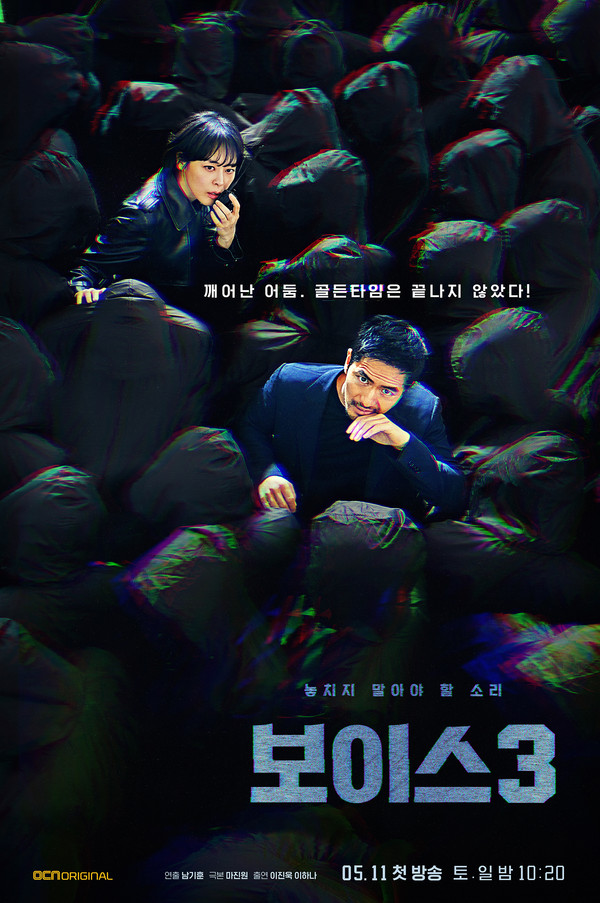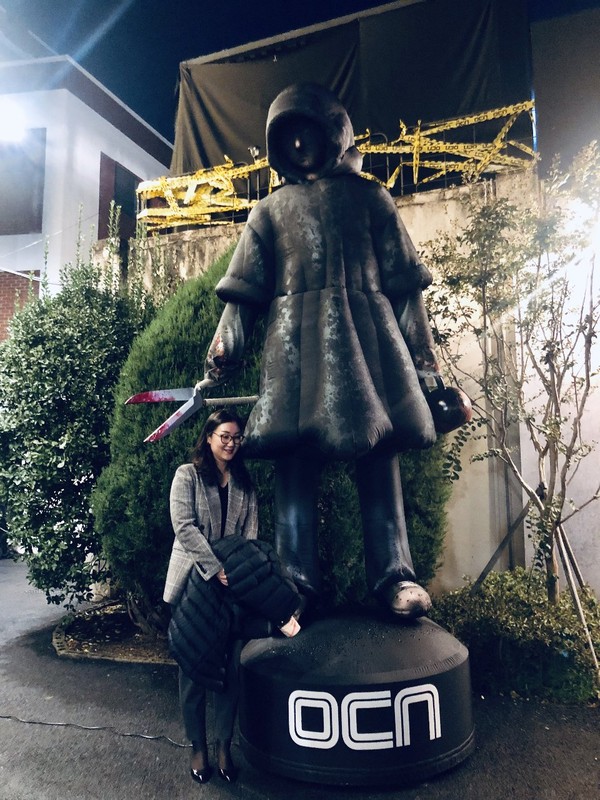
“One peaceful day, the phone rings. A young boy’s voice asks the respondent at 112 for help. Upon instructions from Center Director, who quickly presses the ‘Code-zero’ button, agents begin the search for the child. Focusing on only the boy's voice, the director of the center tries hard to track the boy’s location”. This is one of the scenes in the drama, <Voice>. Reading just the scenario must have made your own nerves rattle. Who creates such suspenseful drama? SMT reporters met with Ma Jin Won, a famous scriptwriter for the drama, <Voice>.
Before getting started, would you please tell our readers a little about yourself as a drama scriptwriter?
I studied German Language & Literature at Sookmyung Women’s University, and I graduated in 1994. Also, I minored in Korean Language & Literature. I dreamed of writing throughout my years of studying literature. After graduation, I started my career as a copywriter with an advertising agency. While the job was satisfying, I wanted to become a drama scriptwriter because I had a great desire to write. Therefore, I went back to school and studied more at a drama academy. After many years of learning, I became a drama scriptwriter.
What is the most rewarding aspect of being a scriptwriter?
Being a drama scriptwriter is much harder than most people would imagine. While it is difficult to work, it is also rewarding. Whenever I meet fans who are impressed by the drama I write scenes for, I feel most rewarded. Also, I feel happy seeing actors and staff working diligently to make my script come to life. Filming <Voice>, one actor said to me, “You wrote a really great piece. I felt it just from acting out the scene in your script.” Words like these empower me as a writer.

In your signature work, <Voice>, you include a wide range of distinctive characters. What made you create such characters and how much research did you need to do to make them come to life?
Drama scriptwriters add a unique color to each character, and I am also no different. In my case, I prefer the suspense genre, and I tend to incorporate it often into my scripts. Therefore, I usually study the dark side of an individual or speculate on ‘What's really deep inside that person?’ These ideas are the driving force behind my character creations. Also, I think it’s important to engage in deep conversations with people around me to apply their characteristics to the drama. Personally, I like to tell stories that are based on those conversations to develop my characters. I suppose most scriptwriters do this. Some scriptwriters travel and listen to the stories of strangers sitting next to them on express buses from which they get inspired to create a storyline.
In the drama <Voice>, your present scenarios of various crimes against the socially disadvantaged. Is there any particular reason you choose to center your storylines on them?
The role of a drama scriptwriter is to present a color picture of society, so I want to increase public awareness and spark interest in the underprivileged by scripting these types of stories into the drama. As a writer who has achieved large public attention, I can make a difference. This belief became stronger when I introduced police investigations into the drama. I, too, started to realize the terrible crimes the underprivileged have faced. I also tried to pay much more attention to fairness and the dangers that women, an underprivileged group in Korean society, experience. This is due to having been educated at Sookmyung. During my school years, I was able to communicate with a variety of women.
What is the most difficult thing you’ve experienced while writing for the drama <Voice>?
<Voice> is a crime-based drama, and it centers on violent crimes. It is often hard to decide which cases to write about. I can’t always write scenes that use strong and provocative issues when dealing with crime. Moreover, since at the core, it’s based on crime, I need to write scripts that detail the challenges the actors have to endure in the episode to solve the case. Importantly, I need to script the episode so that people who have had similar incidents and accidents do not feel uncomfortable. Care is taken so that no victim or family is harmed psychologically. I am also restricted to content. That is, I cannot deal with socially problematic crimes or with certain subjects because of broadcasting review regulations. I suppose that social responsibility is a major limitation that I need to be aware of and deal with.

What is especially difficult about being a drama scriptwriter?
Two things come to mind. First of all, while I’m scriptwriting, I must become completely immersed in writing as its creator. Because I spend months to years on one drama, my other work suffers. It’s also hard to leave the drama once it has come to an end. Second, because I’ve worked so often on thrillers, now 4 or 5 years, I find myself having psychological difficulties. <Voice> is a drama about crime. I’ve had to investigate and study so many crimes in order to include variety in the drama that I sense I’ve become mentally challenged.
In terms of drama scriptwriting, what do you plan for the near future?
As a drama scriptwriter, I want to have my own solid world. <Voice> has its own world. With my next project, I hope there would be a unique and solid world of the work. I want to create an imaginary world that will not be shunned by the public, and at the same time, draw empathy from viewers, even more than I do now. For example, I hope to create fantasy scripts. Each script for a project I write creates a new world, one in which I immerse myself and expand it. Given the chance to be a scriptwriter for a new project after <Voice>, I would like to write something unique.
What is the biggest thing that you learned during your undergraduate days in Sookmyung?
After leaving Sookmyung to become part of the working society, I initially regretted having graduated from a women's university. Outside of school, men and women work and live together. Because I graduated from a girl’s middle school, a girl’s high school, and a women’s university, I had little opportunity to interact with men. Therefore, I thought graduates from a women’s university were disadvantaged. However, this idea changed over time. When I graduated, Korean society did not value or respect women. It continues till today, but women are battling that and raising their status in society. Sookmyung taught me to take the initiative when entering society. As a woman, I thought about why I had to work harder and more tirelessly. However, the reason I could was that I graduated from Sookmyung. I held fast to my identity and the leadership skills I learnt there. Now, I am grateful for having graduated from Sookmyung Women's University.
Last, please leave a few words for Sookmyungians.
I know it sounds cliché, but I hope that you experience all the world offers. Students at Sookmyung Women’s University study hard, and I do think that is important, but having various experiences is also important. Indeed, take time to really think about what you want after leaving university. In university, you have the chance to ponder how to live, what are your dreams, your forte, and your goals. You can think about careers after graduating, but it's what you do during your college years that will make your life more proactive and self-reliant. I hope Sookmyungians find themselves through various experiences.

Ma Jin Won
- Department of German Language & Literature ’94
-<Save the Last Dance for Me (2004)>
-<I am the Legend (2010)>
-<Voice (season 1~3) (2017, 2018, 2019)>
Jung Kim Hyeseung / Reporter
smt_jhs@sookmyung.ac.kr
Kim Han Yujin / Reporter
smt_hyj@sookmyung.ac.kr


